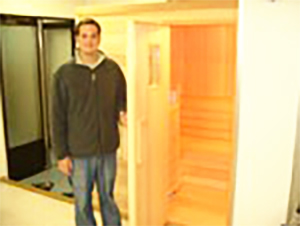若き学生時代に急遽海外放浪の旅に踏み出し、その経験から外国人賃貸業界に深い興味を抱くようになったのが、イチイ社長・荻野氏です。このコラムでは、そんな荻野の体験をコラム形式でお届けします。
※本コラムは『異文化共生住宅』をテーマにイチイ社長 荻野が2005年1月から2006年3月まで週刊住宅に寄稿したものです。
行列のできる管理人室
今日も朝から管理人室の前には長い列が出来ている。それは、「浅草に行きたいけど、行き方がわからない」「会社の面接に行くのだけど、日本のマナーを教えて欲しい」「彼女の実家に結婚の挨拶に行くけど、心配だ・・」などの相談をする居住者の列である。対応する管理人(マネージャー)は、テキパキとコンピューターを使いながら、希望地の地図を取り出したり、面接のマニュアル書を見せたり、日本語と英語を使い分けながら説明をしていく。一人が終われば「ハイ!次ぎ。ハイ!次ぎ」といった調子で、手際よく質問や相談に応じていく。
ゲストハウスが大型化するに従い、現場を運営するマネージャーに求められるものも多くなる。マネージャーには建物の維持管理役と共用部(台所、シャワールーム、娯楽室など)、専用部(居室)の利用の指導役、そして居住者に快適に住んでもらうためのホスト役などが求められる。さらに大型物件になると、娯楽室やサウナ室、ジムなどの設備も加わり、また居住者が多い分だけ歓送迎会などのパーティーも多くなるため、全体のコーディネーター役も務めることになる。
ゲストハウスには大学生、英語会話教師、芸術家、翻訳家や格闘家、見習い料理人そして医者の卵、果ては大学教授など様々な人が住んでいて、しかも年齢も国籍もまちまちだ。この居住者達に“住まいのルール”を説明し指導していくマネージャーには、一般的なビル管理人の業務や能力以外に、語学力と諸外国の文化や宗教に対する知識なども必要になる。
また、ホスト役としてホームシック、失恋、失業などに悩む居住者の話をきいてあげることもある。ある時は父親のように厳しく、またある時は母親のように暖かく見守ってあげ、そして年下の子には兄のように気さくに対応と、ホスト役にも3つの顔があるようだ。ゲストハウスの管理人室はまさに“行列のできる相談所”である。

Coexistence Housing in a Borderless Era: The Evolution of GuesthousesEpisode 8: The Expansion of Guesthouses – Part 2
Today, as every morning, there’s a long line in front of the manager’s office. The line is formed by residents wanting to consult on various matters, such as “I want to go to Asakusa but don’t know the way,” “I have a job interview and need to know about Japanese manners,” or “I’m worried about visiting my girlfriend’s parents to announce our engagement…” The manager, efficiently using the computer, pulls out maps to the desired locations, shows interview manuals, and explains in both Japanese and English. As soon as one person is helped, it’s quickly onto the next with a “Next, please! Next, please!” efficiently addressing each question and concern.
As guesthouses grow in size, the demands on managers who run the sites increase. Managers are required to maintain the building, oversee the use of shared areas (kitchens, shower rooms, recreation rooms) and private rooms, and act as hosts to ensure residents live comfortably. With larger properties, facilities like recreation rooms, saunas, and gyms are added, and with more residents, there are more parties, like welcome and farewell gatherings, necessitating the role of an overall coordinator.
Residents of guesthouses include a diverse group: university students, English language teachers, artists, translators, martial artists, apprentice chefs, medical students, and even university professors, varying widely in age and nationality. Managers need to explain and instruct the “rules of the house” to these residents, requiring skills beyond those of a typical building manager, including language proficiency and knowledge of various cultures and religions.
Moreover, as hosts, managers sometimes lend an ear to residents struggling with homesickness, heartbreak, or unemployment. They may need to be strict like a father at times, warm like a mother at others, and friendly like a brother to the younger ones, embodying three roles in one. The manager’s office at a guesthouse is indeed a “consultation booth with a queue.”
无边界时代的异文化共生住宅:客栈的演变 第8集:客栈的扩大 – 第2部分
今天,像每个早晨一样,管理室前排起了长队。队伍由想要咨询各种事项的居民组成,例如“我想去浅草,但不知道路怎么走”,“我有一场工作面试,需要了解日本的礼仪”,或是“我担心去我女朋友的家提出结婚…” 管理员高效使用电脑,拿出目的地的地图,展示面试手册,并用日语和英语进行解释。一旦一个人得到帮助,就会迅速转到下一个人,以“下一个,请!下一个,请!”的方式,高效地解答每个问题和关注点。
随着客栈规模的增大,运营现场的管理人员面临的要求也在增加。管理人员需要负责建筑的维护管理,监督共用区域(厨房、淋浴室、娱乐室)和私人房间的使用,并且担任主人角色,确保居民舒适生活。对于更大的物业,增加了娱乐室、桑拿室和健身房等设施,由于居民较多,欢迎会和告别会等聚会也更多,需要担任整体协调者的角色。
客栈的居民包括多样的群体:大学生、英语会话教师、艺术家、翻译、武术家、见习厨师、医学生,甚至大学教授,年龄和国籍各不相同。管理人员需要向这些居民解释和指导“住宅规则”,除了一般建筑管理员的工作和能力外,还需要语言能力和对各种文化及宗教的知识。
此外,作为主人角色,管理人员有时也需要倾听那些因思乡、失恋或失业而苦恼的居民。他们可能需要时而像父亲一样严厉,时而像母亲一样温暖,对年轻人则像哥哥一样友好,兼具三种角色。客栈的管理室确实是一个“排队的咨询亭”。
荻野社長ブログはコチラ▶ https://co-lifestyle.net

